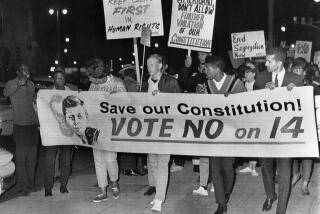Take Back Leadership Role on Rights : Legislation: Congress must enact legislation to undo damage done by the Supreme Court and revitalize America’s civil-rights movement.
- Share via
The startling political changes that have occurred in East Germany, Eastern Europe, the Soviet Union and, now, in long-despaired-of South Africa, represent to my mind the greatest simultaneous civil-rights movement the world has ever seen.
The lesson to be learned is that human beings, regardless of where they are, will ultimately demand freedom and other basic rights. It is hoped that these tremendous political, social and economic changes will spur our own lagging democratic movement and domestic revolution.
It is too easy to be smug and look upon this country as a peerless example of democracy in action. However, poverty and injustice are not the hallmarks of democracy. Statistics on minorities at all levels of life point to the need for continuation of our own civil-rights movement.
America has not successfully addressed the growing gap between the haves and the have-nots. We have yet to confront the remaining areas of discrimination in our society. To continue to lead the democratic world, we must re-double our efforts and commit our resources.
An aggressive Congress is a major component of America’s rededication to this goal. As the first item on its agenda, Congress must commit itself to undo the damage done to the cause of equality by the U.S. Supreme Court in its last term. Bipartisan congressional leadership has undertaken to do that with a major new civil-rights bill.
The Civil Rights Act of 1990 seeks to remove the tremendous obstacles and burdens that several Supreme Court decisions imposed on the laws related to job discrimination. The bill places the burden of proof on the employer, provides greater protection against racial harassment on the job and protects against retroactive changes to court-approved affirmative-action plans. It would go a long way toward restoring the commitments regarding job discrimination made to minorities and women in Title VII of the Civil Rights Act of 1964 and in a 1966 amendment..
Both congressional and civil-rights leaders across the country recognize that the Supreme Court, with its new conservative majority, is a tremendous threat to women, minorities and the poor. This majority has served notice that it has little or no regard for the clear, unmistakable discrimination that many continue to face. It is equally clear that Justice Sandra Day O’Connor will not be a voice for women’s rights or any other minority position. She is an “old boy” in the truest meaning of the phrase.
The 1960s in this country served as the historical precedent for Congress acting to address injustice. It is only when the people insist on change, as they did then and as they have done in other countries recently, that it comes about.
I was an early prodder and beneficiary of an activist Congress. When I was 10, my mother announced that we were going to join the civil rights movement. As a writer, she felt she must witness and record the greatest social movement of her lifetime.
We traveled by automobile, my five brothers and sisters, mother and I. There were to be six trips between 1960 and 1965. For all but the last, we had to reroute our trips to include those cities that had Negro motels and restaurants because we could not stay, or be served, at any other facility. Only in 1964, after Congress passed the Civil Rights Act, did unrestricted and fully accessible public accommodations become the law of the land, and we would map a trip without regard to the four or five black motels and restaurants between California and Montgomery, Ala.
The 1990s show every indication of being a startling decade. Among the most important ways Congress can provide justice in America is to pass the Civil Rights Act of 1990, and insist on the recognition of the new global realities by making huge cuts in the defense budget, particularly in the acquisition of weapons systems. These funds can then be invested in human beings; laws designed to provide for the rights and betterment of our citizens mean little without resources.
Congress must help establish the national consensus necessary to divert our economic resources from weapons and armies to job training, shelter, education, health and child care. The lesson for America in all we have observed lately is that we must get in line with the worldwide democratic movement and provide maximum freedom and opportunity for its own.
More to Read
Get the L.A. Times Politics newsletter
Deeply reported insights into legislation, politics and policy from Sacramento, Washington and beyond. In your inbox twice per week.
You may occasionally receive promotional content from the Los Angeles Times.










